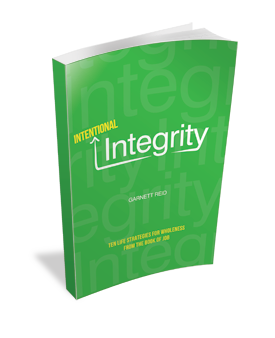
February-
March 2012
What Do You
Treasure?
Digital Edition
----------------------
History Resources
|

Intentional Integrity
by Garnett Reid
Garnett Reid, professor at
Free Will Baptist Bible College, is author of Intentional Integrity: Ten Life Strategies for Wholeness From the Book of Job. The book takes an in-depth look at Job 31
and notes 10 promises of integrity Job made. In a recent interview, Dr. Reid shared his feelings about the book.
Q: What’s the premise of the book?
A: God presents Job as a model of integrity. That is, his life is a whole; Job has a center, an axis holding everything together. God is that focus, and everything Job is and does reflects his loyalty to God.
Q: The title is Intentional Integrity. How do you define integrity?
A: The Hebrew word translated integrity in the book of Job speaks of that which is complete, undivided, all of one piece. Anything with integrity lacks no essential quality. For us, integrity is living a life consistent with the principles of God’s character. It prevents us from falling into the trap of compartmentalizing life so we are one thing in some settings and something else in others. Integrity is a product of fearing God. It’s what a relationship with God looks like to those watching us.
Q: In the introduction you state, “Consistency alone, then, is not enough to produce a life of Christian integrity.” Explain that for us.
A: While integrity does involve consistency, there’s much more to the mix than just that. We can be consistent and faithful, but if the theological and moral foundation upon which we build is faulty or false, our consistency will not produce a true life—a godly life. When we bond our lives with believing commitment to God and His truth, the result is integrity. Integrity equals commitment plus truth.
Q: Why do you think this book is pertinent for people today? Why should people read it?
A: Most every prevalent trend in our culture works to dismantle integrity. If all truth is relative, what works for you may not work for me; this may be right for you but not for me, and so on. It is a pattern our culture bullies us into thinking. Any allegiance to an unchanging source of truth is labeled quaint and out of touch, or worse, intolerant and extremist.
As David Wells says, “we no longer think in truth terms.” To paraphrase Emerson, in popular culture, nothing is sacred today except the self. Integrity is seen as being true to yourself; thus, the “faces” you put on change depending on the setting and the image you want to convey. We have seen in our society, though, how a lack of integrity decimates relationships, undermines families, and ruins lives. Unfortunately we see it all too often in the church as well.
Q: The book focuses on 10 commitments Job made in Job 31. Which of these commitments do you find most difficult personally?
A: I struggle with all of them from time to time because I love myself too much. At the heart of all of these promises is the ultimate need of loving God more than anything else and loving others because I love Him. I identify well with Paul in Romans 7 by doing things I don’t want to do and not doing things I should do. If I had to single out one ongoing battle, I suppose it would be the honesty promise. It’s just so easy to cut corners with truth telling.
Q: Where does the Holy Spirit’s empowerment come into play with these commitments? Can we have true integrity without Him?
A: That’s an interesting point, and an important factor to consider. I am afraid some people will read the book and think that Job mustered up his integrity by his own determination and the sheer force of his will. In the final chapter, I try to make it clear that all of these traits of loyalty grew out of his fear of the Lord. That is, he knew God and as a result, his life took on the characteristics of Shaddai, the almighty God Job loved. Therefore, all that the Holy Spirit does in convicting, renewing, and saving us is a part of Job’s experience of integrity. It is all of God. Job simply responded by trusting God, and that relationship produced the fruit of integrity in his life.
Q: Who do you think should read the book?
A: I think Intentional Integrity would benefit any Christian who struggles with living a consistent Christian life. That probably covers most of us. I believe, though, that Christian men and men’s groups, small Bible study groups, and Sunday School classes would especially benefit from reading the book. It would be an excellent source for personal Bible studies as well.
Q: What have you learned from writing this book?
A: Three things, at least: (1) The Bible is always relevant. (2) At the core, human needs and the struggles we face in life never change. (3) God’s truth is sufficient alone to build a life of integrity.
About the Writer: Garnett Reid is professor of Old Testament at Free Will Baptist Bible College. Find his regular column “Intersect” in each issue of ONE. Read his blog at GarnettReid.com.

Purchase your copy of
Intentional Integrity today at www.randallhouse.com.
|
|

